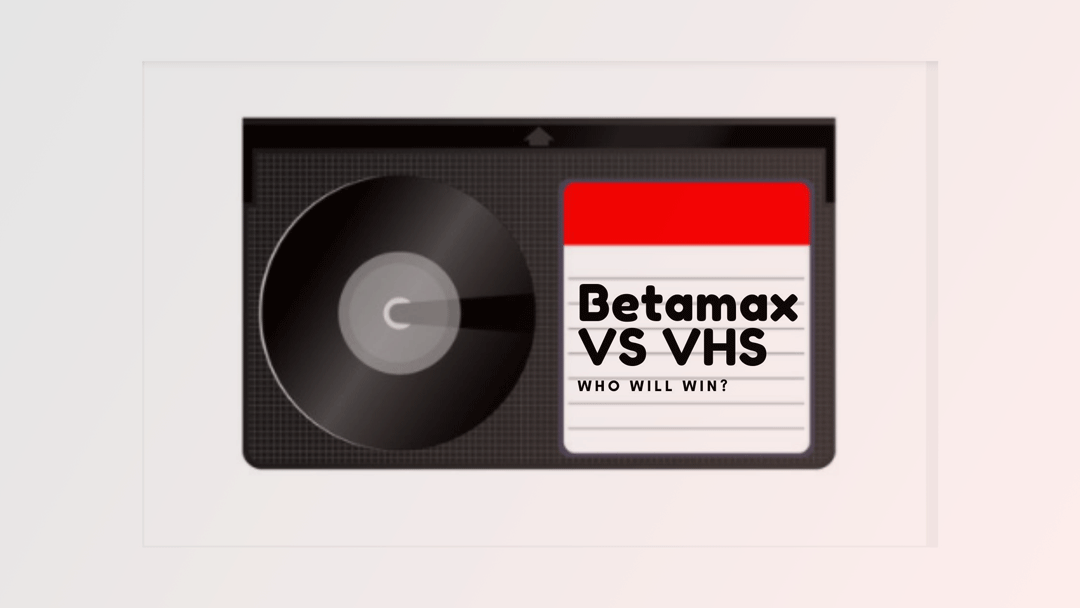Video Format War VHS vs Betamax?
So what do you think? betamax vs vhs?
Beta and VHS were the most popular video formats in the 1970s and 1980s.
If you are old enough to remember visiting your grandparents during the holidays, you would remember the huge video player sitting on the console television in the living room.
That was a Sony Betamax video cassette player and, for its time, was a high-quality piece of technology.
As a consumer, you could watch a 2-hour video at home with your family instead of going to the theater.
The problem was that Beta machines weren’t affordable and took up much space.
When VHS landed on the market by a company named JVC, it was a game-changer.
You now had a longer recording time of 1-hour or 2-hour movie length.
The VHS machines were much smaller and allowed you to record movies from television.
In asking, “Why did Betamax fail?,” the answer lies in that people wanted a consumer-friendly price tag and a smaller VCR cassette and machine to play their movies. These same reasons would eventually led them to want to convert video cassette to digital.
The Inception Of A Rivalry: Sony’s Betamax Meets JVC’s VHS
The video format war began with the introduction of Sony’s Betamax in the mid-1970s. Betamax, short for ‘Better Maximum,’ resulted from Sony Corporation’s quest for a higher-quality home video system.
Around the same time, the Japanese company JVC introduced its VHS (Video Home System) format. The stage was set for an epic showdown.

Betamax’s Niche Appeal and VHS’s Universal Adoption
Despite its eventual loss in the market, Betamax maintained a niche appeal. Enthusiasts and professionals prioritizing higher quality and better resolution continued using Betamax.
However, the universal studios and production companies aligning with VHS technology and its more extended playtime capability ensured VHS’s success in the broader consumer market.
Which Is The Best Video Format? Betamax VS VHS
In the battle, Betamax video format had better quality and won with the highest resolution video playback, audio, and picture quality.
At the time, consumers looked past the quality of Betamax and decided that VCRs were a better purchase due to their size and cost.
Sony and JVC battled back and forth throughout the 1970s, with sales slowly creating a price war.
Ultimately, VHS would become the clear winner, making Betamax obsolete.
Why Did Betamax Fail?
Betamax owned the market share regarding video recording and home movie playback.
Many families owned Betamax machines, but they couldn’t be available to the mainstream because of the prices.
Sony did not allow other manufacturers an opportunity to license the technology or make it affordable to do so.
Consumers ask for a machine that would allow for increased recording time and longer tape length.
Not listening to buyers created a situation that JVC saw to design a better product that consumers and manufacturers could afford.
Sony’s Strategic Choices And The Demise Of Betamax
Sony’s refusal to license Betamax technology widely was a strategic error.
While VHS manufacturers banded together, creating a broader support network for the format, Betamax lacked the support of enough hardware companies.
This lack of collaboration was pivotal in the eventual demise of Betamax.
Moreover, the higher price of Betamax players and tapes compared to VHS technology was a deterrent for the average home user. Betamax struggled to gain a foothold in a market where price and convenience often trump quality.
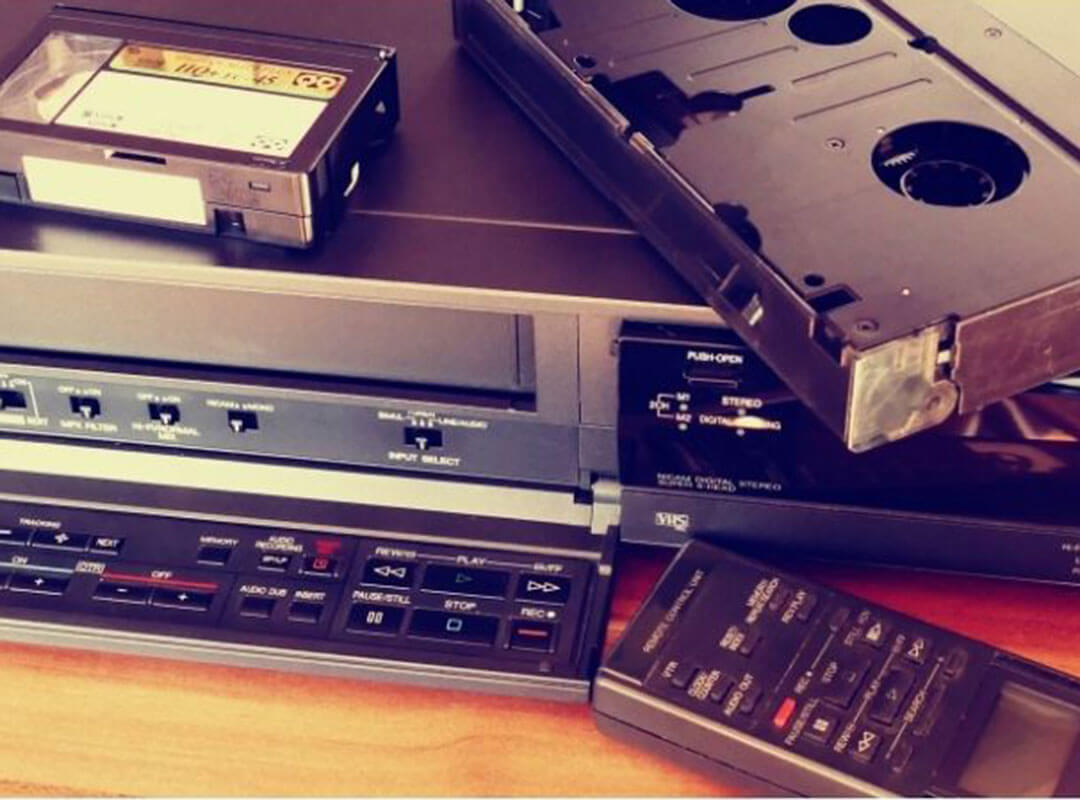
Why Was VHS Better Than Betamax?
People found VHS a better option than Betamax due to price, size, and recording time.
Betamax was superior to VHS regarding video and image quality, but JVC would recognize that consumers wanted convenience and price over resolution.
Sony and JVC would enter a VHS vs. Betamax format war in the 80s, and who could create a better product with a longer time to record at the best price?
VHS recorders would allow you to record and copy a full-length movie from your television to the VCR.
The Turning Point: VHS’s Success Factors
By the late 1970s and early 1980s, several factors began tipping the scales in favor of VHS. One significant aspect was the lower prices of VHS VCRs.
Understanding the consumer market’s sensitivity to price, VHS manufacturers strategically kept prices affordable, making VHS a more popular choice among the general public.
Another major factor was the support of the film industry. Major movie studios and video stores rapidly adopted the VHS format.
The network effect of VHS’s success became apparent as more rental stores stocked VHS tapes, and VHS sales surged.
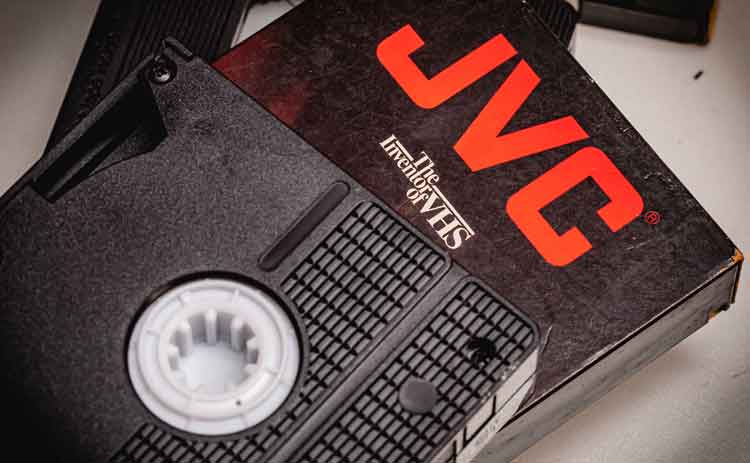
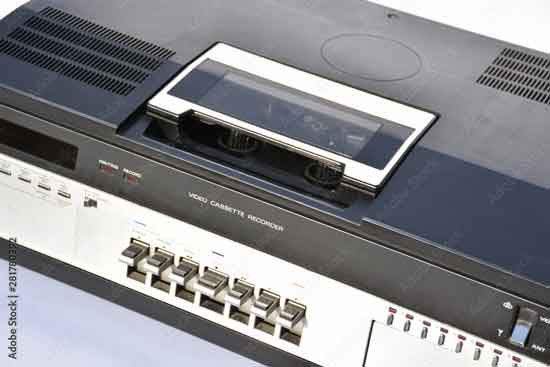
Are Betamax Tapes Worth Anything?
Like anything nowadays, some collectors want old VHS and Betamax movies to add to their library.
Some people still love analog technology and might argue that vinyl albums and VHS tapes sound and look better when played.
Having a physical tape, you can watch it whenever you want. All you need is the equipment like a VCR or Betamax machine.
Today, if you want to enjoy an old movie, you must save it to a hard drive or computer system.
It’s easy to transfer VHS to digital format; most of the time, it will improve the quality of sound and resolution.
However, owning the original media holds a meaningful memory of when you first watched it.
Some first-generation tapes can cost hundreds of dollars to the right collector.
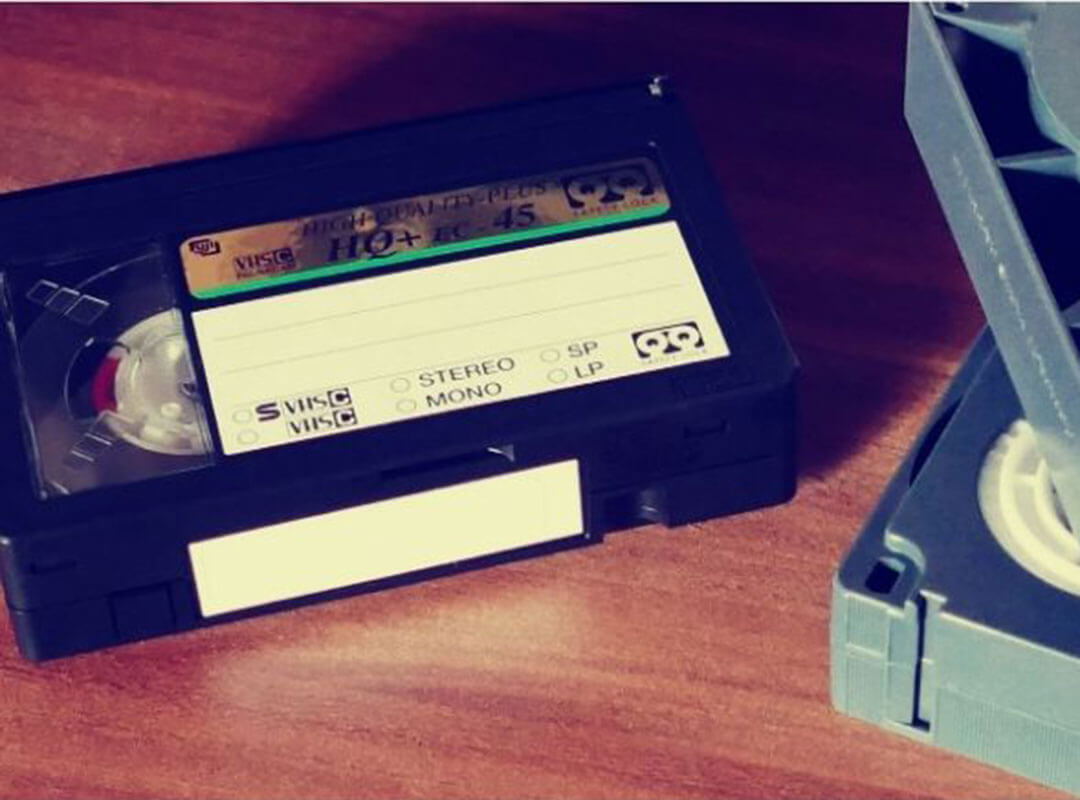
Though not the best quality, the VHS/VCR format was half the price of Beta and allowed you to record longer. Should I Keep VHS Tapes?
If you own your family’s old home movies, converting them to digital format would be great. Memory Fortress offers VHS to digital service and will send you back the original VHS tapes when complete.
The critical thing to remember is VHS and Beta tapes deteriorate over time if not stored properly.
VHS tapes must be kept from the sun and stored in a cool, dry place with consistent temperature.
The fastest way to damage a videotape is to expose it to extreme heat or cold.
Store your Betamax and VHS vertically to eliminate the risk of warping or cracking.
Keeping your home movies and classic cinematic movies is a good idea if they hold value for you and your family.
How Much Did The First Betamax Cost?
When Betamax was first released 1975 to households worldwide, no one could believe the price tag.
Only the elite could afford Betamax machines, and if you owned one, you were sure to be somebody in your community.
The price tag for Betamax machines would set you back $2295 for advanced models and the basic model just under $2000.
You can see how Sony lost its advantage when the VCR was introduced, and the price was much lower.
How Much Did The First VCR Cost?
In 1977, JVC saw an opportunity to enter the market with their version of the at-home video recording industry.
The VCR, like Betamax but a much smaller and cheaper version, would become new in home entertainment.
A VHS cassette tape that could play on what they called a VCR machine.
As we spoke of earlier, you would be able to record longer movies at half the price.
The price of a VCR would retail between $1,000-$1,400, and I know what you might be thinking: it’s still a chunk of change.

The Digital DVD Player
In a new era, we have come a long way in video quality and price of machines.
The DVD was released on March 31st, 1997, leaving VHS cassettes to be outdated.
DVD players were not only much cheaper but also less expensive than VHS tapes.
Not a significant price drop, with the first DVD machine retailing for $600-$1000.
But the quality and speed at which DVDs could be played was much higher and could hold many more media formats than just video.
Soon, consumers would upload and record images, videos, and documents via a computer disk video recorder (DVR).
Today, DVDs and DVRs are still relevant; we use them to store movies and photographs for our customers.
Transfer Old Video Cassettes To DVD
Video is more vital than ever, with cell phones and digital cameras as high-resolution options.
Just open your social media, and you will see shorter videos shared more and more.
Storage options are USB, DVD, and cloud hosting, where you can store your images and video so as not to lose them.
It’s a good idea to back up your old VHS and Betamax movies to a DVD.
We offer an affordable service that converts your VHS format into digital media.
Check out our process below if you want to save your movie collections or photo albums.

Building Relationships With Motion Picture Companies
Understanding the evolving consumer preferences, JVC leveraged its relationships with motion picture companies, significantly contributing to VHS’s dominance in the format war.
This strategic move enhanced VHS’s popularity and established it as the preferred format for movie rentals and purchases.
The End Of The Analog Videotape War
By the late 1980s, it was clear that VHS had won the videotape format war. The compact cassette design, combined with strategic choices by JVC and its allies, ensured the widespread adoption of VHS technology.
Although Betamax offered superior picture quality, the combination of more extended playtime, lower prices, and the universal support of video content providers crowned VHS the victor in the eyes of the general public.
At the end of the day, the VHS vs Betamax battle serves as a compelling case study in the dynamics of market forces, consumer preferences, and the crucial role of strategic choices in the tech industry.
Despite its loss, Betamax’s legacy in pushing the boundaries of video quality lives on, influencing the development of subsequent digital services and formats like the compact disc and digital video.
For those who remember the era or own these formats, Memory Fortress offers state-of-the-art digital conversion services, preserving the cherished memories stored in these analog relics.
Transform Your VHS Tapes Into Timeless DVDs: Discover Memory Fortress, The Premier VHS to DVD Conversion Service Near You
Preserve and relive the magic of your cherished VHS tapes by transforming them into high-quality DVDs that will stand the test of time.
With Memory Fortress, you can trust our expertise, exceptional customer service, and commitment to outstanding results.
Don’t let your precious memories fade away – choose Memory Fortress and preserve them for generations to come.

